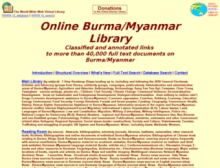Resource information
In October 2013, the Human Rights Foundation of Monland (HURFOM) released
"Disputed Territory", a report documenting the emerging trend of Mon farmers fighting
for recognition of their land rights in the face of unjust land and property
confiscations. The report analyzed specific barriers impeding their success, from weak
land policy and inadequate dispute resolution mechanisms, to an absence of support
from various sources.
While "Disputed Territory" explored the broad spectrum of land right violations among
Mon communities, our current report focuses more specifically on the progress, or lack
thereof, in cases of military land confiscation. In this regard, over a year has passed and
yet Mon farmers continue to find themselves in a fruitless struggle. New details of past
and on-going unjust military land acquisition continue to be brought to HURFOM and
other media outlets, on the one hand proving that Burma’s political climate has become
a safer space for victims to petition their rights, while on the other hand showing that
significant challenges continue to preclude true justice for housing land and property
(HLP) rights violations.
Since the release of "Disputed
Territory", and addressing one of
the barriers to justice it
highlighted, Mon farmers have
gained greater access to
education regarding their HLP
rights, and are more aware of
procedural requirements for
landholders under the 2012 land
laws. However, while farmers
have repositioned themselves,
armed with information and
supported by advocates,
progress remains stalled:
farmers’ land rights and tenancy remain insecure, properties confiscated by the military
have not been returned, and farmers have not yet been justly compensated. Although
there are legal channels through which farmers may now petition for their rights,
appeals go unanswered. Compounding the lack of restitution for previous infractions,
Burma’s small-scale farmers continue to live under the threat of future, continued land
confiscations.
With the value of Burma’s land steadily increasing, farmers are eager to have their land
returned to them, or be provided with just compensation. Patience is running thin
among those seeking justice, as the government continues to deny responsibility for the
military’s crimes and government bodies established to resolve land disputes fail to do
so. Farmers have learned their lessons from the past, changed their strategy in fighting
for their rights, but the results remain the same.
Building on previous analysis, HURFOM contends that continuing barriers to progress lie
primarily in the country’s broken land management system, the failures of recent land
laws to secure the protection of farmers’ land rights, the failure of government bodies
and authorities to perform their responsibilities unbiased from military influence, and
the total impunity of the military due to the independent structure of the courts-martial.
Ultimately, HURFOM advocates that deep structural change regarding these deficiencies
is required, in order to redress past violations and protect farmers’ land security into the
future; in doing so assisting the slow process of reconciliation and trust-building
between Burma’s government and Mon populations...


